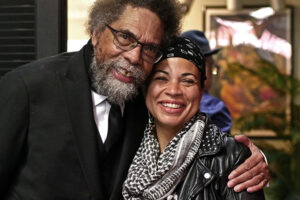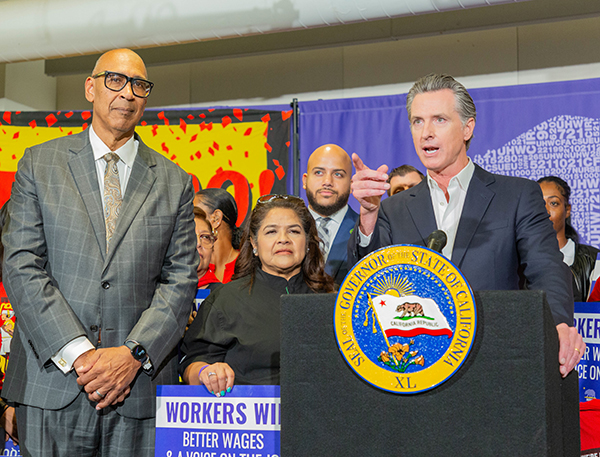By Shirley Hawkins
Contributing Writer
LOS ANGELES — Motivational speaker Les brown was once labeled in school as “educatably retarded.”
Now he speaks to large groups of people trying to motivate them to improve their lives.
He was the first speaker at the annual Black Business Expo Sept. 12, which was held virtually this year because of the coronavirus pandemic.
Fifty speakers and 48 workshops attracted business owners, entrepreneurs and those interested in Black enterprise.
”You have greatness in you. You have something special,” Brown told his audience. Over the years he had spoken to groups in 51 countries, but like many business people, he has been forced to make changes this year because of the pandemic.
“I had just come back from Dubai where my overseas speaking fee is $225,000 per hour,” he said. “But when I got home, all of my speaking engagements had dried up. I had to rethink my business. I have a saying, ‘When things go wrong, don’t go with them.’”
Brown said that he has sympathy for the thousands of entrepreneurs whose businesses are struggling during these challenging times.
“Many people are fearful right now,” he said. “Nearly 50 million people have lost their jobs. Most people in a fearful situation forget everything and run. But there are some people, some business owners, who face everything and rise.”
He told the audience that it is crucial to remain resilient in the face of fear.
“Over 200,000 people have died from COVID-19, but you’re still here. That means that there is still more work for you to do.
“Have a vision of what your new life and future is going to look like,” Brown said. “Helen Keller said, ‘When one door closes, another one opens.’ But most of us spend our time feeling powerless, hopeless and depressed thinking about that closed door. We need to gather our wits about us and start thinking and looking for the open door.”
He said that in the era of COVID-19 people should change their mindset from fearful to determined.
“I want you to envision what your life will look like coming out of the pandemic and tenaciously hold on to that vision,” he said. “Have a daily ritual of writing down seven things that you are grateful for. Act as if your goals and dreams have already been accomplished.
“You’ve got to work on you now,” he added. “All accomplishments start in the mind. I invested in myself and the rest is history. You have to work on your mind and see this time as a blessing for you.”
Another speaker, Jewel Diamond Taylor, also spoke about the changes people have faced this year.
“Many of our lives have been disrupted with drastic changes as well as traumatized by all the racial unrest and violence,” she said. Our community has been insulted and assaulted economically, emotionally, racially and mentally.
“When it comes to the pandemic, we must learn to get equipped so we can’t be whipped by the stress. Our feelings and response to stress can be costly.
“We have to have a mindset to be resilient, make a plan, take action and don’t procrastinate. We must train our brain with positive adoption, faith and courage.”
Taylor said that in times of crises, it is more important than ever to reach out to friends, co-workers and loved ones.
“Reaching out to others is not a sign of weakness,” she said. “I stay connected to people through phone calls, Zoom and texting. I have weekly Zoom sessions every Sunday at 3 p.m., which I call ‘The Filling Station.’ People from all over the country tune in for advice.
“Right now, I share counseling and life coaching help for those who need coping skills to deal with issues of fear, stress, relationships, faith fatigue and persevering to reach their goals.”
Taylor said she has also grappled with uncertainty in these troubled times. “The sessions help me to resist the dark emotions of isolation, fear and worry,” she said.
In light of the seismic changes happening in society, she advised, “We must be more focused and adapt to change. I want to inspire people to shift and pivot and to become problem solvers and innovators right now because only the strong will survive.”
Rosie Milligan, founder of Professional Business Management Consulting Services and CEO of Milligan’s Books, a senior estate planner and owner and founder of Black Writers on Tour, said, “I think that the Black community is suffering from economic hemorrhage. We need to stop the bleeding. Most of the economics in the Black community is being drained into someone else’s hands and community.
“I want our children to be on the first floor of the economic ladder rather than to be born in the basement,” Milligan said. “That is why our community is so devastated, because every generation has to start anew.
“It is important to pass a legacy to our children. I encourage parents to help their children qualify for a piece of property. You may not own a business, but you may own a house. That house must pass through generations so we can position ourselves for generations of wealth.
“Many people don’t understand the importance and power of having a living trust,” Milligan said. “At the end of the probate process, many people lose their homes. Their credit is not good and they don’t earn enough money to pay the mortgage.
“So that’s part of the economic hemorrhage because the mortgage on homes is too high and the mother and the father have gotten several loans on the property.”
Pausing, she added, “We don’t prioritize our money. We spend it in the wrong places. Ten billion dollars is spent annually on hair and 70% of that is spent by Black women.
“To acquire generational wealth, we have to focus on things that will appreciate in value such as a home,” Milligan said. “Buy a house before a car. Many people’s car note is 5, 6, 700 dollars a month because the interest rate is so high. Then they don’t qualify for a home because their debt ratio is too high.
“Do not wait for the government to provide stimulus money that is not going to last,” she added. “I suggest that people come together. If you can’t buy that house by yourself, piece up. Invest in 10% of that house.
“If you’re struggling, people should move in together and share their money. But set the rules before you have anyone move in.
“Between now and the next six months do not buy a car or clothes. Then look at the money that we will save in our community. Gentrification is real but poor planning is causing as many problems as gentrification because we are not doing estate planning. We’re losing a lot of homes and homes are where you accumulate wealth.
“Leave your children something,” she said. “Don’t leave them in the economic ditch or beneath the economic rubbish.”
Author and motivational speaker George Fraser, who has built a multimillion dollar network, outlined several principles that he lived by.
Growing up as a foster child, Fraser admitted that he had trained himself to conquer any type of adversity.
“Number one, I used tragedy to elevate my life,” he said. “Number two, I had a deep commitment to excellence. Number three, I devoted myself to seeking knowledge, personal growth and development and lifelong learning.
“Number four, I had a commitment to financial education,” he added. “Number five, I committed myself to entrepreneurial thinking. Number six, I am a staunch believer in networking. Number seven, I committed myself to overcoming obstacles.”
Fraser said that the pandemic is a time for reflection.
“God is in control here,” he said. “The year 2020 is a time to get back in touch with your soul and elevate your work. There is unlimited opportunity (in business) even now. We must focus on personal growth and development.”
Fraser said that more Blacks need to familiarize themselves with financial literacy and pointed out that white household wealth is 20 more times higher than Black household wealth.
“Our parents did not learn financial education and it is not taught in our schools,” he said.
“How are you going to compete in the economy if you don’t understand money? Money is right up there with reading, water and food.”
“We are addicted to instant gratification rather than delayed gratification,” Fraser added. “That’s a very bad habit, Nielsen said that the average Black American watches 70 hours of television a week. How are you growing and improving if you’re watching television? Put the remote control down. Read more to broaden your mind.”
He added that Black America is in an existential crisis.
“White folks have been planning finances for three generations and Black folks are planning for a Saturday night,” he said. “Get rid of most of your credit cards and stop impulsive purchases that will leave you broke.
“Your best years are ahead of you. Overcome the obstacles and do the work.”












